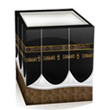It Is Forbidden For Women To Beautify Themselves For The Mosque
- Details
- Category: Sheikh Bin Haadee
- Published on Sunday, 17 November 2013 12:06
- Hits: 1359
It Is Forbidden For Women To Beautify Themselves For The Mosque
Question:
What is the ruling on women beautifying and perfuming themselves for the taraweeh prayer believing that to be an implementation of the statement of Allaah: "And take your adornment (adorn yourselves) in every masjid.." (Al-A'raaf:31).
Answer:
The Prophet, salallaahu 'alaihi wasallam, allowed the women to go to the Mosques at 'Eeshaa time under the condition they go whilst adequately dressed - meaning, clothing that is not eye-catching or draws the attention [of people] and they are not perfumed.
Abu Hurayrah, radhi Allaahu 'anhu, said: Indeed the Prophet, salallaahu 'alaihi wasallam, said: "Any woman who leaves [her dwelling] perfumed, [seeking] that the men smell her, is a fornicator."
____________________________
Translator's note: A'isha, radhi Allaahu 'anhaa, narrated: Allaah's Messenger, salallaahu 'alaihi wasallam, used to offer the fajr prayer and some of the believing women, covered with their veiling sheets, used to attend the fajr prayer with him, and they would return to their homes unrecognised. (Saheeh Al-Bukhaaree, English translation, Hadeeth No. 368, Vol 1.)
Shaykh Muqbil bin Haadee
'Fadaa'ih wa Nasaa'ih', Al-Allaamah Al-Muhaddith Muqbil ibn Haadee al-Waadi'ee, Daarul-Haramain, Cairo. Page 86.
Translated by Abu Khadeejah





















